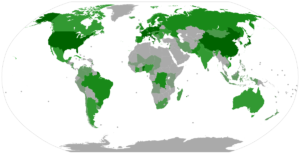I personally consider Esperanto to be more than just a fun game or amusing way to communicate: it is a serious matter, that involves notions of Justice, Equality and Fraternity between humans.
But before everything else, what is Esperanto?

Esperanto is an international constructed language used as a lingua franca by people from at least 120 different countries throughout the world, including as mother tongue. Being the official language of no state, Esperanto makes it possible to establish a neutral bridge between cultures.
Requiring a short learning process to master it, Esperanto is presented as an effective and economically fair solution to the problem of communication between people of different mother tongues.
It was in 1887 that Ludwik Zamenhof, under the pseudonym Doktoro Esperanto (Doctor who hopes) who will later give his name to the language, publishes the International Language project. The language developed rapidly in the early years, giving rise to publications and international meetings.
Esperanto is not affiliated with any party, religion, or ideology. The only idea shared by most of its users is the idea of equality between people and communication without language barriers. Esperantists have different opinions on everything, including Esperanto: they are not all aimed at making Esperanto the second language in the world.
To sum up, Esperanto conveys ideas of respect, tolerance towards others, and friendship between people. It is, therefore, a language carrying within itself principles that will one day become the bond of humanity if this one does not wish to go to its loss.
There are two urban myths however which need to be exploded. Firstly that “everyone speaks English” and secondly “no-one speaks Esperanto” . Neither of these are true but need to be challenged.
– Brian Barker
In order to have a better understanding of the interest in learning this language, I invite you to read the following top 10.
IMPORTANT: I don’t say that we should not learn English. On the contrary, I love this language, how it sounds and it’s the first language I became fluent in so I’m very attached to it. English and Esperanto are both considered international languages, but for me, there is nothing to do with choosing the best one or the one that will replace the other. I wish that no one will ever substitute another. However, by being able to speak them both, you contribute to conveying inestimable values to the world.
Enjoy! ♪

1) Equality: “Men are born and remain free and equal in rights…”
… except If the English language were to become the language of Europe, Anglophones would, in fact, have more rights over other European speakers.
It may sound ridiculous, but it is not: you can be discriminated against it. For instance, if you’re applying for an international job that requires a perfect mastery of English, if the boss hesitates between you (let’s say you’re a Spanish native speaker) and a British, he would probably take the British person (considering you have both the same experiences and skills).
This is already happening in Europe. All schoolchildren must learn foreign languages (ie English), but in practice, the degree of motivation is quite different in English-speaking countries.
British schoolchildren are very little motivated to learn foreign languages, and they are not obliged to do so as in other countries. Arrived at the teenage or adult age all the communication being done in English, they thus not only saved time compared to their foreign comrades but in addition they have a clear advantage in the communication.
Think of all the hours spent by our children learning English that they will never be as good as a comrade of their English-speaking age anyway.
On the contrary, those who did not spend the same time on language learning will have spent their energy to progress probably in other areas, especially scientists, thus benefiting from a new advantage.
Only 30% of students in the United Kingdom devote the same efforts as other Europeans to the study of foreign languages.
2) It could help Europe’s economic issues improving
An important part of the difficulties of the European Union comes from the diversity of languages and linguistic separation between the rulers.
It costs a lot for others countries to impose English lessons on each child. Taking into account the multiplier effect of certain components of this sum, as well as the return on funds that English-speaking countries can invest elsewhere, this total is 17 to 18 billion euros per year.
“Of course there is widespread teaching of English throughout Europe, but the results of that investment of time and money are poor, in my view. I´ve lost count of the number of times [people] have told me something like “I learn English since nione years” but are unable to direct me to the station!”
– Bill Chapman
“To sum up, teaching Europe’s 500 million citizens Esperanto would, so runs the logic, be more cost-effective and a better investment of time and money.” (cf source 5)

Distribution of Esperanto association members by country
3) It makes traveling easier and cheaper
Have you heard of CouchSurfing? It is a homestay platform that allows you to find someone to host for free or to accommodate a traveler in your home volunteering. Well, there is an equivalent for Esperanto-speakers: the Pasporta Servo. It is the best way to get to know other countries, people or cultures and enrich yourself! This is perfect:
- If you really want to know a country or region without following a horde of tourists
- If you are interested in the daily life of people, and not in the image of a country or clichés
- If you want to travel cheaply
You can check the official website (in Esperanto) if you’re interested! https://www.pasportaservo.org/
4) You are able to access a whole new culture that also belongs to you: original music, movies, literature, history….
Esperanto is an entire planet that communicates and exchanges. It allows easy access to very different cultures without any predominance of one over the others. Esperanto has also developed a culture of its own.
There are more than 30,000 books in Esperanto (about 70% of which are original) and more than 100 journals in this language are published regularly.
Each year new literary texts and new songs are written, and Esperanto magazines are published. Esperanto music has its own label, Vinilkosmo. Radio Arkivo and Radio Esperanto are stations available online on the web, many other programs on other stations deal with various topics and Esperanto films are produced.
As far I’m concerned, I believe it concretely helps diversity. Indeed, Esperanto is not just a language but, above all, a factor in the spread of cultures from different countries. We can discover cultural works from different countries thanks to Esperanto. This is even more true for works written in minority languages.
5) Be connected together and make friends
You don’t know it, but Esperanto speakers are everywhere around you, it’s like being a freemason haha! Being linked by the language (international on top of that) make it easier to meet new persons, chatting and create new relationships.
Moreover, I believe it helps to stop separating ourselves and divide us into “countries”.
You are not your country. It’s not because you’ve been raised in a country governed by a tyrant that you have to assume all the damage and be labeled as a pawn.
On the contrary, it’s not because you consider your country to be perfect that you have to despise all the countries next door. Some countries may have better hard power or a more flourishing economy without for all that being actually superior. Why should the life of a baby born in France receive more attention than a baby born in Sudan? A human is a human and we all deserve to be treated well and with respect. We are all composed of the same chemical elements, we all have the same needs, love, food, water.

6) Tolerance: The community is blooming and welcoming everyone with benevolence.
The majority of Esperantists are determined in contributing their help for a better world. They are particularly open-minded and careful about others. For example, everyone speaks Esperanto in their own way, there is not really a better accent. No competition, no hegemony, no superiority. Only equal humans.
Fun fact: you can believe at first that the Esperanto-speaker community is only full of vegetarians-communists-Left political Party etc. Admittedly, yes a big part of them. But still no everyone haha! I know Esperanto-speakers who are completely opposite, who are not necessarily fond of learning languages etc. Everyone is welcome.
7) It is easy and quick to learn
Esperanto was constructed in order to be learned easily. The grammar is regular, vocabulary is basic and adjustable, and there are no exceptions. (I can hear from here all the French learners’ relief)
For instance, I can be sure that an Esperanto will understand the word ‘elmariĝi’ even if he has never heard it, and he will probably not notice that I have just invented a word. (cf source 2)
You can learn the basic 16 rules of Esperanto grammar easily in a few hours, and then start learning the vocabulary. But as with any other languages, it requires consistency to master it. For example, a study was made about how much time a French speaker needs (around) to speak a new language. The results?
2000 hours studying German = 1500 hours studying English = 1000 hours studying Italian (or any other Romance language) = 150 hours studying Esperanto.
For example, my goal was to be fluent in one year. It’s been already 3 months and I already understand most texts! (And for the comparison, I’ve started reaching fluency in English after 5 years of studying)
Moreover, dyslexics have fewer problems learning Esperanto than any other language.
8) It makes learning easier
Language learning is a slow and long process. Although there were many attempts to improve their teaching, the majority of pupils leaving school are not able to express themselves correctly in a foreign language.
A study focused on the advantage that can be gained from the prior knowledge of Esperanto on the learning of another language (in this case, German-language learners learning English).
A group of students studied English for 5 years and another group studied Esperanto for 2 years, then English for 3 years. It turned out that at the end of the study, the group of students who had learned Esperanto before English was more proficient in English than the group that had only learned English. This study is very important because it clearly shows that learning Esperanto accelerates the learning of another language. Esperanto can thus be seen as a “catalyst” in this context. (cf source 5)
But there are many others studies of the same kind. For example, during one year, three schools taught Esperanto, three other schools a European language, and two schools taught an Asian language. The students then left the primary cycle to join the secondary cycle. During this shift, secondary school teachers were not made aware of the specific curriculum of their students. Finally, a survey measuring motivation showed that all students who learned Esperanto as a first foreign language are motivated to learn a foreign language, unlike others.
The study also shows that students who have learned Esperanto achieve better results in their learning levels and in their oral abilities than others.
9) Gives love to learning languages
As I’ve written above, you can be fluent in a few months (it costs nothing to try, especially with all the big results you can receive).
I don’t know you, but when I had the “click” that made me finally think in English, without translating in French (my native language) first. It really gave me joy and satisfaction. It also motivated me to do the same in other languages. And because Esperanto can be learned quickly and makes other languages learning faster, it will help you enjoy the process!
Don’t forget: it’s by loving what you do that you will be determined and progress faster. It also means that you will be able to see all the benefits of learning a language quicker! And this leads us to the last point…
Tim Morley perfectly summarizes this point during his TED Talk:
10) By learning Esperanto, you benefit from the same advantages of any other language: you contribute to the world.
I’ve written an article about why I personally think that learning foreign languages is more than a simple game and can actually solve problems. It’s not because Esperanto is a constructed language that it does not bring the same benefits as others! That’s why I invite you to read this article that will maybe help you decide if Esperanto learning is really for you or not.
And who knows, It is perhaps with Esperanto that we will pass to future generations the universal values of tolerance and respect?
Where to start?
- All the resources here! https://www.fluentin3months.com/esperanto-learning-resources/
- Don’t forget to check classes around your houses or events if you prefer human contact
Sources : 1 // 2 // 3 // 4 // 5 // 6
I hope you enjoyed this article and learned facts! I’d love to hear what you think about Esperanto. I know that many people don’t agree at all on that subject. 🙂
Moreover, I hope that if you’re an English native speaker, you didn’t feel offended or anything! I confess that by posting it I was afraid that people would understand the wrong way.
Anyway, I hope to see you later!
Ps: As a non-English native speaker, I would be grateful if you could alert me of any English mistakes. It helps me improve and future readers will also appreciate it!
Have a nice day ☀








